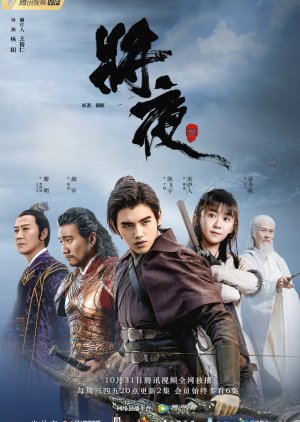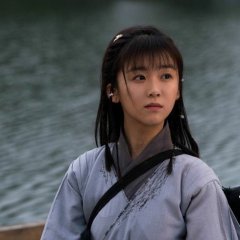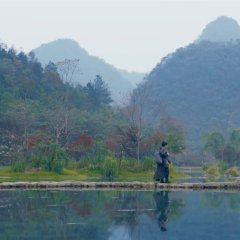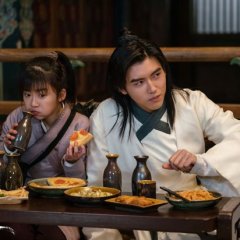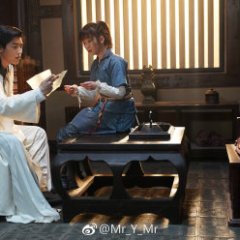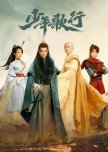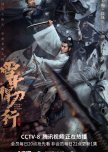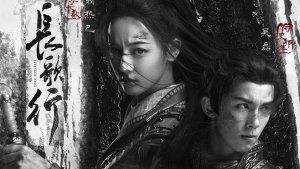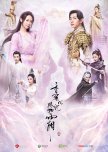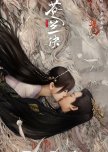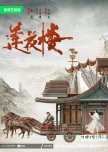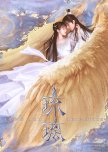 7 Surprising Facts About the K-drama Alchemy of Souls!
7 Surprising Facts About the K-drama Alchemy of Souls! Eles são escolhidos, à sua própria maneira, para proteger seu povo e seu país. Ning Que é o único sobrevivente do regime do General Lin Guang Yuan, que sofreu um ataque calculado e brutal de outro perigoso general. Ning Que consegue escapar para a Cidade Du com sua criada, Sang Sang, e entra na melhor academia de artes marciais de lá. Quando Sang Sang contrai uma misteriosa doença, Ning Que a leva ao médico e acaba descobrindo que ela é a reencarnação de Yong Ye, um ser misterioso e poderoso que, segundo uma profecia, trará apenas o caos. Com forças do mal tentando colocar as mãos em Sang Sang para canalizar seu poder, Ning Que deve pôr a própria vida em risco para salvar Sang Sang e seu povo. (Fonte: Viki) Editar Tradução
- Português (Brasil)
- 中文(台灣)
- 中文(简体)
- Русский
Onde assistir Noite Eterna
Elenco e Créditos
- Arthur Chen Papel Principal
- Ireine Song Papel Principal
- Adam Cheng Papel Principal
- Hu JunXia HouPapel Principal
- Kris Sun Papel Principal
- Zoey Meng Papel Principal
Resenhas

The relationship between Ning Que and Sang Sang is complex due to their unusual circumstances and there are multiple layers to their dynamic. She initially appears to be a maid who happens to be very fond of the person she serves, but it's quickly evident that their power dynamic is not quite that cut-and-dried. When he was a young child, he found her as a baby in a pile of corpses and took her in. They are a few years apart in age, and although he was obviously her caretaker in her younger years, it wasn't too long before she was carrying her own weight. He has made a living by killing bandits, while she has taken care of domestic chores and finances. There are subtle elements of caretaker-dependent and older brother-younger sister to their interactions at times, but overall they seem best described as platonic life partners for the first thirty or so episodes (with occasional, subtle hints of romantic feelings/attraction).
Later in the series, when Ning Que shows up with a love interest after a period of being away from home, they're forced to confront their true feelings and figure out what they really want. It's pretty obvious just by the fact that Sang Sang is the second lead which way Ning Que will lean (or even by the synopsis on this page), so I don't think this could be considered a spoiler. I watched this drama on Viki with comments on, so I know how divisive their relationship is. It is an upsetting development for some viewers who only see one aspect of Ning Que and Sang Sang's dynamic. Some viewers consider Ning Que to be too much of a father figure to Sang Sang to accept the turn their relationship takes, claiming (or implying) that it is incest. I personally don't agree with this viewpoint – but if you think the relationship could be squicky for you based on how I described it, and you believe that would interfere too much with your enjoyment of the series as a whole, you may want to give this one a pass. Just a heads up.
I rated this drama highly in large part because I really enjoyed most of the characters and the main relationship (I can forgive a lot if I become attached to the characters), however I did feel that there were some issues with the plot. The pacing is a bit uneven, and the exposition scenes are quite dull at times. Although there were a couple of exceptions, I felt that the antagonists were much too one-dimensional. The character arc for one of the main antagonists – Long Qing – particularly felt like a waste of time. Most of his scenes could have been left out and the result would have been the same. That was especially irritating given that his scenes were so tedious to watch. The last ten episodes are sluggish and feel like they could have been cut in half (at least). In fact, the same could be said for the series as a whole - but that has been true with almost any Chinese drama I've seen.
Another thing that I found off-putting is that, sometimes, some of the characters would know what's going on in a distant location without any apparent reason - as if they were watching it on television. When it was Fu Zi - who is generally considered the greatest cultivator in the world - I decided to just go with it. It didn't make sense, but whatever. When it was Fu Zi's disciples, I also just accepted it; they learned it from him, I guessed. But when it was still used with characters who had no background in cultivation, it became kind of aggravating. No matter what, it feels like lazy writing, but there really should be some brief explanation given for something like that. Similarly, there were many times when characters received news quicker than really seemed believable. Things like this were just minor annoyances, but they did pull me out of the viewing experience.
I've read some criticisms of Chen Feiyu (Arthur Chen)'s acting, but I didn't think he was a bad Ning Que overall. He was actually pretty expressive, though unevenly so; he was effective at conveying affection/infatuation and anger/aggression, but fell short in scenes that required him to express emotional anguish and physical pain. One thing that I found a bit annoying is that he frequently raises/moves his eyebrows in a way that kind of looks like they're spasming. Sometimes the eyebrow raise is effective, but more often it's not. That aside, I became attached to his character in spite of his considerable shortcomings, and some of that was due to Feiyu's charm and charisma. (Note: He won't be returning to the role in the second season due to scheduling conflicts; he will be replaced by Dylan Wang.)
I felt that Song Yiren (Ireine Song)'s acting was stronger; she was lively, sweet, and adorable as Sang Sang. Whatever the scene called for, she was almost always able to hit the right emotional notes. When I watched the trailer, the only thing I had reservations about was her character, so it's kind of ironic that she ended up being my favorite. I looked forward to her scenes most, and I'm very glad Song Yiren will be returning for a second season. There were many great supporting characters, and the other actors were quite good overall. I enjoyed the fact that several older characters had prominent roles in the story, and they also ended up being among the most interesting characters to watch (most notably Chin Shih Chieh as Yan Se and Ni Dahong as Wei Guangming).
So, tl;dr:
Pros – memorable characters, cute relationship, great action scenes, beautiful cinematography, lovely OST, mostly good CGI
Cons – one-dimensional antagonists, potentially squicky relationship (YMMV)
If you're into action/adventure and fantasy dramas, and you don't think that the main relationship would negatively impact your ability to enjoy the series, then definitely give this one a shot.

Beware of false prophets.
Ever Night is an epic fantasy adventure hit set in a mystical, ancient world where the balance of power between rival kingdoms is maintained with the aid of powerful warlords and cultivator sects. The vivid stunning palette is infused with an ominous sense of dark prophecy. The soothsayers warn that the child of darkness will bring an ice age or ever night and chaos to the world.The main protagonist Ning Que makes an thrilling debut as a lethal, almost ferally vicious warrior in a ferocious, spectacular desert ambush. This opening sets the tone for some of the most exhilarating and well choreographed fight scenes that Chinese drama has to offer. The drama is visually spectacular and delivers on the hype on many fronts, especially in terms of its movie quality production values. The sweeping breadth of the story can be overwhelming in the sheer number of characters representing different kingdoms and sects that makes the story appear more complicated than it really is. This is really the story of Ning Que (and by extension Sang Sang's) quest for revenge that sets him on an epic journey to become one of the strongest cultivators in Haotian.
Ning Que is an anti-hero. He is ruthless, cunning, manipulative and can be quite dishonourable. While at at times Chen Feiyu's acting could do with some polishing, he is superbly cast as Ning Que. He emanates that simmering resentment and burning thirst for vengeance that propels Ning Que to prevail against overwhelming odds and superior foes. With his lithe powerful build, his combat scenes are bloodthirsty and violent and his facial expressions are vicious, almost feral. Ning Que's arch-rival the glorious Prince Longqing is an interesting mirror character on a parallel path that makes different choices at important milestones along the way. What is quite remarkable about this story is there are no outright villains. The world they exist in is cruel and fraught with peril and conflict among competing interests. Thus both the antagonists and protagonists have to do ruthless, even terrible things to survive.
Unlike others, I am not troubled by the relationship between Sang Sang and Ning Que. They have no blood ties, they are simply found family and have a complex and multi-layered relationship that is likely predestined. In fact, I think it is inevitable where the relationship must go. As much as I enjoy their undeniable chemistry and clear bond immensely, to me the real issue is that Chen Feiyu and Song Yiren should never be cast together in a romantic capacity. Chen Feiyu is exceptionally tall and Song Yiren is exceptionally petite. Her youthful features and small size makes her look like a child next to him. This visual imprint is so strong it is practically impossible to imagine them as a couple. Their relationship in Season 1 remains platonic and is not troubling but it is a good thing that Wang Hedi replaces Chen Feiyu as Ning Que for Season 2.
In terms of storytelling, there are issues with pacing and the breadth and depth of the character and world building is perhaps overly ambitious in scale. Even though I love how there are different schools of cultivation and cultivators are able to gain immense power via different theologies and practices, I find the excessive pontification and philosophical discourses mind numbingly boring. That said, I appreciate the ultimate irony of how many powerful cultivators are ruled by superstition and fear of ever night or the child of darkness. While the worthy ruler and the true wise men know to beware of false prophets. The political arcs are not that interesting and Princess Li Yu and her brother don't add to the plot. They just take up space and despite all the screen time, this and several other sub plots like the inner politics of the West Shrine and Yan State go absolutely nowhere. Obviously this lays the back story for multiple (?) seasons but unfortunately none of these sub plots and characters are interesting enough to make me want know what happens to them.
Despite the digressions and morass in the middle, the drama builds towards a very strong ending. I was truly moved by Ning Que's speech when he finally confronts his family's killer and I was really impressed by Chen Yufei's acting in that moment. "Why does it always have to be a prince?" is one of the best, most memorable lines from this show. The build up in tension, that sense of dread and hope into the ending confrontation is superb. The final fight scene is epic, full of surprises, utterly savage, desperate, exhilarating. It was everything I didn't even know I was craving for. Even the CGI is amazing.
I thoroughly enjoyed many aspects of this heroic saga and I am happy to recommend this as a not to be missed drama for action and adventure buffs. But unfortunately there are many parts of it that I did not enjoy and I feel strongly that the production over indulged in laying the backstory for many subplots that only play out in subsequent seasons. I am going to go with an 8.5 because the production values and fight scenes are exceptional. Going purely on storytelling alone however, this is at best an 8.0.

